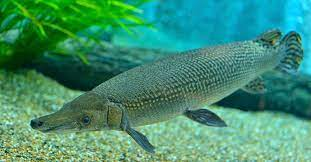Important Facts For Prelims
Alligator Gar Fish
- 20 Jun 2023
- 3 min read
Why in News?
The discovery of an Alligator Gar fish (Atractosteus spatula), an invasive species in Kashmir's Dal Lake has raised concerns.
- The Lake Conservation and Management Authority (LCMA) and the Department of Fisheries are collaborating to understand the extent of the invasion and its potential impact.
What are Alligator Gar Fish and the Risks Associated?
- About:
- The alligator gar is a close relative of the bowfin species. It is a ray-finned euryhaline fish (creature's ability to adapt to a wide range of water types that range in salinity) and is one of the biggest freshwater fish in North America and the largest species in the ‘gar’ family.
- It is found in some parts of India such as Bhopal and Kerala.
- They grow rapidly and have a life span of 20-30 years.
- The alligator gar is a close relative of the bowfin species. It is a ray-finned euryhaline fish (creature's ability to adapt to a wide range of water types that range in salinity) and is one of the biggest freshwater fish in North America and the largest species in the ‘gar’ family.
- Protection Status:
- IUCN: Least Concern.
- Concerns:
- Gar fish can grow up to eight feet. They can be dangerous for indigenous fish species. During winter, they can even sustain themselves in the cold waters of Dal because the temperature they mostly live in is 11-23 degrees Celsius
- The Biological Diversity Act 2002:
- The Biological Diversity Act 2002 prohibits the presence of invasive fish species that could harm natural fish populations.
Dal Lake
- It is a lake in Srinagar, the capital of the Union Territory of Jammu and Kashmir (J&K).
- It is one of the world's largest natural lakes and the second largest lake in J&K.
- It is integral to tourism and recreation in Kashmir and is named the “Jewel in the crown of Kashmir” or “Srinagar’s Jewel”.
- It is also an important source for commercial operations in fishing and water plant harvesting.
- It covers an area of 18 square kilometres and is part of a natural wetland including its floating gardens.
- The floating gardens, known as “Raad” in Kashmiri, blossom with lotus flowers during July and August.





